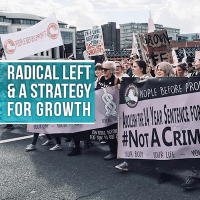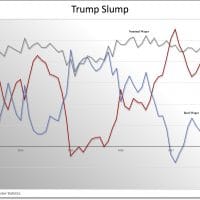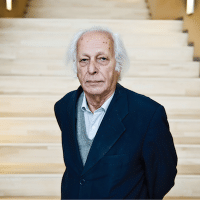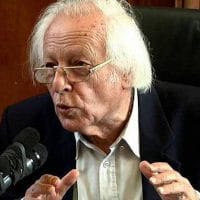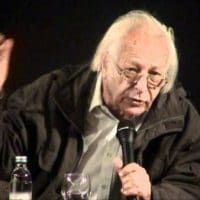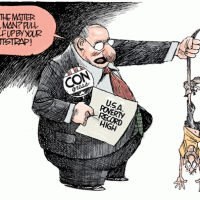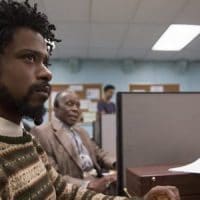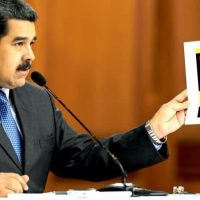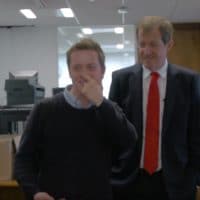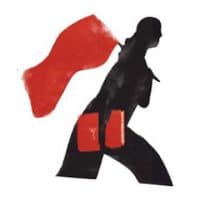-
Interview with Angel Prado (Part I): “The commune holds the solution to the crisis”
A grassroots Chavista leader reflects on the future of the communal project and the contradictions in the Bolivarian Process, in this interview with VA’s Ricardo Vaz.
-
What is behind Facebook deleting teleSUR English’s page?
Suddenly without warning, between 4 and 5 pm on Monday, August 13th, the Facebook page of teleSUR English was unpublished for the second time this year.
-
Colonialism 2.0 in Latin America and the Caribbean
Once the internet became the world’s central nervous system, the U.S. borders were extended across the planet.
-
The radical left & a strategy for growth
The present social order is showing remarkable signs of decay. Slowing economic dynamism and growing geopolitical rivalries have produced a dangerous and chaotic world.
-
Capitalism vs. water
Capitalism vs. water.
-
Black workers and immigrants: borrow a page from Marx
Tom Broadwater, a brother, recently wrote a commentary titled “Democrats’ Immigration Dogma is Damaging African American Communities.” It appeared in the Afro American newspaper and in Newsweek.
-
Don’t class warfare me
Marketplace’s Kai Ryssdal is no class warrior.
-
Death of a Marxist
Amin’s thesis—in economics—was written while he was active in the French Communist Party. In the thesis, he thought hard about the problems of his native land and other countries despoiled by the colonial menace. For Amin, as with other dependency theorists, the Third World suffered from theft, plunder as well as deindustrialisation, and then unequal exchange.
-
In memoriam: Samir Amin
Samir Amin, the renowned Marxist thinker and economist, passed away on August 13 in Paris. Born in Cairo on September 3, 1931, to an Egyptian father and a French mother, he had his initial education in Egypt before moving to Paris where he obtained his doctorate in Political Economy.
-
Samir Amin stood for people
Samir Amin transcends all borders capital creates to divide peoples struggling against exploiters, against all divisive politics, against all sectarian ideologies, which serve imperialism. Samir Amin stands for a modern life for peoples while opposes all backward ideas and ideologies serving exploiters.
-
Magical bootstraps and the struggles of working Americans
A recession is coming, sooner or later. Once it hits, we can expect articles bemoaning the fact that working people didn’t build-up their savings during this record expansion to help them through the hard times. If only they had pinched pennies here and there, skipped a new TV or smart phone, they could have generated some capital that could have been invested…. Ah the missed opportunities.
-
A note on Samir Amin
Samir Amin’s work will provide inspiration to revolutionaries in their struggle against capital for many years to come.
-
Science fiction and the angel of history
A review of, ‘Sorry to Bother You’.
-
The hope of ecosocialism
“The gross irrationality of our economic and social system is a measure of what we could do to improve the lives of people and the environment.”
-
Meet the far-right conspiracy idiots who stormed Bookmarks
THE halfwits who went berserk in the central London socialist bookshop Bookmarks on Saturday afternoon are supporters of a oddball far-right group called Make Britain Great Again (MBGA), which is also inconsistently called the People’s Charter Foundation.
-
The oldest profession
In the second installment of our subseries Rebel Women, Madeleine Johansson gives her thoughts on the topic of ongoing debate, sex work, and how we on the left should relate to it.
-
Why the attempt to assassinate Maduro?
While many countries claim to be protect civil rights and democracy, their ties to imperialism ensure silence in such moments. They predictably failed to denounce the assassination attempt, even after signing international agreements defining an attempt on the life of a head of state as a “terrorist act.”
-
Cuba reiterates unconditional solidarity and support for President Maduro and the Bolivarian Chavista Revolution
The revolutionary Cuban government issued a declaration forcefully denouncing the attempted attack on the President of the Bolivarian Republic of Venezuela, Nicolás Maduro Moros, which occurred Saturday August 4, during a military parade in Caracas.
-
Social Imperialism in the 21st century
A sober analysis of the positions of Owen Jones and Paul Mason on a wide range of issues shows that they are in fact distinctly un-radical, frequently opportunist in nature, and (particularly in Mason’s case) openly reactionary and imperialist.
-
Socialism is back, with good reason
The spectre of socialism is again haunting world politics.




